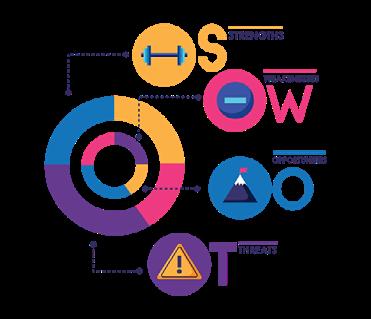
4 minute read
CAREER Fulfill your career ambitions
Launch and challenge yourself to FULFILL YOUR CAREER AMBITIONS
Have you been thinking about launching your business or upgrading your career? Do you want to challenge yourself to grow towards your idea of success? STOP overthinking; grab a pen and a notebook or your favourite digital note-taking device. Let’s get you prepared to take decisive action today!
Advertisement
“Failure to plan is a plan to fail.”
Before you dive into the tips section below that has been created to help you move forward in your desired career, start your own business, change your job, or gain promotion in your current role.
The essential tips are the same for all stages, and it requires you to make time for self-awareness and build on your daily action taking habits. all know that tomorrow never comes, especially if you are already busy.
Tip 1: Time to reflect and evaluate your current position
Throughout your career and life, you should always reflect daily on your goals, actions and how you feel about the outcomes - good or bad.
When planning your next
How to use the tips shared
In this article, I will ask you to do a little bit of self-evaluation by writing down your answers and reflecting on your goals and plans.
As you read, write the tips’ heading and fill in your answers straight after reading this.
WARNING If you save this bit of work until tomorrow, we move, ask yourself and write the answers.

● Why do you want the change? ● What do you hope to achieve? ● What do you need to do to achieve it? ● How would you feel when you have accomplished your goal? ● How do you feel about your current situation? ● What are your motivations for the changes you want to make
There are various questions you want to explore, and it is essential to note down everything you are thinking about the decision you intend to make.
If you have limited time, conduct a SWOT analysis on yourself. This task will give a visual view of your (internal) strengths, weaknesses, (external) opportunities and
threats. You will be able to see whats skills you may need to learn to make your career move, what options are available externally to support you, and how your weaknesses and external threats may block your paths. You will then create a plan to turn weaknesses into strengths and find external opportunities to kick the dangers out.
I would encourage you to create a Poster of your SWOT and keep track of how you are turning your weaknesses into strengths.
Tip 2: Understand what Barriers you have control over and those that require external guidance.
Addressing barriers is part of you developing good selfawareness habits and personal growth. Meaning you have to do a little bit of work to manage the obstacles. Start by listing the potential, known, and hidden barriers currently holding you back.
Doing this bit of work will help you identify where your mindset is and provide you with opportunities to break down the barriers within your control.
It will release excess baggage that you may not realise is leaking out during your interactions with employers, business partners and potential network. Write down your barriers and state which you can control and those that require external support.

Tip3 Research, Insights and Network
With every decision you make regarding your career or business plans, research, insight, and networking are your new best friends. Add these activities as part of your daily tasks, such as joining a Facebook group or social media channel within the profession or industry you are interested in entering. Set 20-30 minutes a day reading books, blogs, articles or news specific to your career interest. Connect with people on LinkedIn, attend events and invest in updating your skills set. Write down questions you are struggling with during your research and use this to ask when you attend events or join social media live streams. These activities will help you make the right decisions with launching your business or changing your career. You will be informed, confident and have developed a habit of keeping your eyes on the continually evolving economy.
Tip 4 Set goals with a daily action plan
Now you have addressed your barriers, defined your reasons for your career change and have some insight and knowledge to back up your decisions. You now need to set goals and deadlines.
We are talking about using SMART with the five principles of goal-setting, including clarity, challenge, commitment, feedback, and task complexity, to visualise where you want to be in 1-5years. Without goals, you are casting your net into thin air.
According to research on goal-setting carried out by Dr Gail Matthews at the Dominican University in California, you are 42 % more likely to achieve your goals if you write them down.
When you have created your long term goals (1-5 years), break them down into short term goals 1-12 months. When you have done that, break it down again, and this time, turn them into daily action. This way, you will know you are always working towards achieving your big goals and taking daily steps will reduce procrastination, improve motivation and focus.
In Summary - Evaluate your current position, define why you want to change your career, address the barriers, research your chosen industry and set goals with measurable action that you will reflect daily to ensure you are on track. Add the added secret sauce of keeping your skills updated with short courses. For the over-thinkers, I would say, “Feel the fear and do it anyway”-Susan Jeffers.











